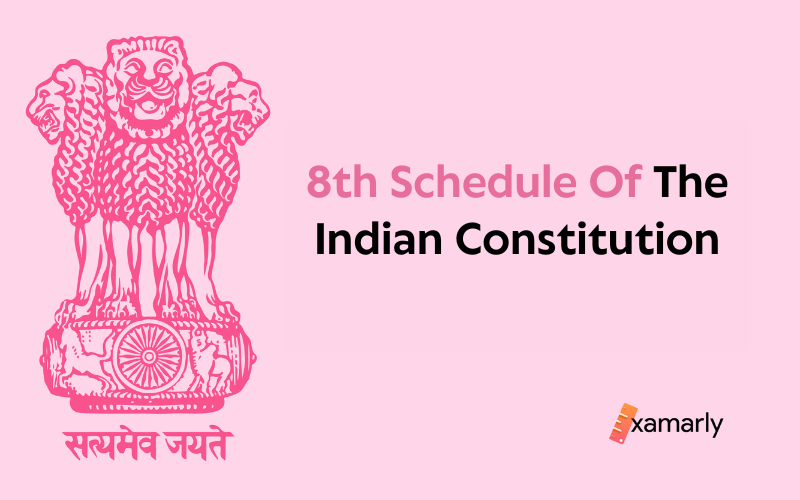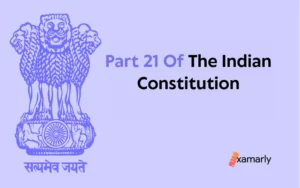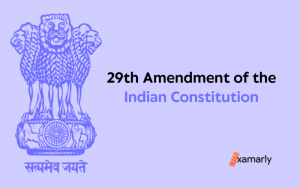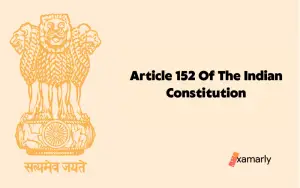The Constitution of India includes 12 schedules. These schedules deal with the details of certain topics that are mentioned in the various articles and policies. Here, we will be learning about the 8th schedule of the Indian Constitution. This schedule specifically deals with and provides a list of the official languages of India. Initially, this list was made up of 14 languages. As of 2016, there are 22 listed in the schedule.
In this article, you will learn more about the eighth schedule, related acts, 8th schedule languages, and its history. This is a must known topic in Indian polity for UPSC aspirants. Read on.
- History Of Schedule 8 Of The Indian Constitution
- What Is The 8th Schedule Of The Indian Constitution?
- Purpose
- Articles Related To The 8th Schedule Of The Indian Constitution
- Official Languages Act 1963
- Official Language Resolution 1968
- List of 22 Scheduled Languages Of India
- Special Directives
- Criteria To Incorporate Language Into The 8th Schedule
- Classical Language Status
- Conclusion
- Previous Year UPSC Question
- Frequently Asked Questions
History Of Schedule 8 Of The Indian Constitution
Originally, the Eighth Schedule of the Indian Constitution listed 14 languages. However, it was later expanded three times to include vernaculars other than English. The addition of the Sindhi language came with the passage of the 21st Amendment Act in 1967. The 71st Amendment Act of 1992 included Konkani, Manipuri, and Nepali. The 92nd Amendment Act of 2003 added Maithili, Bodo, Santhali, and Dogri. 22 scheduled languages of India are listed in the 8th schedule of the constitution as of 2016.
What Is The 8th Schedule Of The Indian Constitution?
India is a country rich in diversity. There is no national language. Its population speaks 121 languages, including 270 mother tongues. Of these, 22 languages have been designated as official by the Indian Government as per the listing in the 8th Schedule. Of these, 14 were included in the original constitution, and the rest were added through subsequent amendments.
Purpose
This Schedule aims to help the diverse communities of the Indian Subcontinent coexist peacefully. Listing anyone as the national tongue could result in an unjustified stance for the other Indian languages. To progress and embrace diversity, it is safe to refer to them as official. Thus, it is possible to list the following as reasons why the schedule is marked:
- It allows for safe access to the nation’s diversity
- Gives equal representation to all.
- Providing access to government in their native language, empower indigenous groups.
- Provides more opportunities for efficient trade, business, and commerce on the basis of common vocabularies.
Articles Related To The 8th Schedule Of The Indian Constitution
Official languages are elaborated in Articles 343 to 351 of Part XVII of the Indian Constitution. The following are the constitutional clauses that apply to the eighth schedule:
- Article 344: Parliamentary Committees and Commissions on Official Languages
- Article 344(1):
- A Commission must be established by the President in accordance with article 344(1) when five years have passed since the Constitution’s birth and subsequently after ten years.
- To advise the President on the effective use of Hindi for official purposes of the Government of India, it should be composed of a chairman and other members symbolizing the various languages listed in the 8th Schedule.
- Article 351: It calls for the growth of Hindi so that it can be used as a means of communication for all components of India’s composite culture.
Official Languages Act 1963
The Act is based on the Constitution and the Official Languages Act of 1963. It established Hindi and English as the official languages of the Parliament. It also granted states and Union Territories the freedom to choose their own official languages. It also provides that a Committee shall be constituted after ten years, on a resolution passed by either House of the Parliament or both Houses of Parliament.
Section 3 of this Act overturns the English usage time limit of fifteen years. Section 5 of the Act provides that the provisions of the Act relating to the use of English shall continue in force until resolutions have been passed by the legislatures of all the States not having made Hindi their official language. For the purposes of any judgment, decree, or order passed or made by the High Court for that State and for any judgment, decree, or order passed or made in that language, the Governor of a State (with the exception of Jammu and Kashmir) may authorize the use of Hindi or the official language of the State in addition to English.
Until now, the Indian states were not required to choose one from the Eighth Schedule. However, since English is the official language of the Union, the law was amended to add eight additional languages. In addition, English remains the official language for all official purposes in the Union and every state. However, Hindi may be used for high court proceedings if the Governor of a state authorizes it. Hindi means Hindi written in the Devanagari script. However, the high court must use English as the official vocabulary.
Official Language Resolution 1968
The Union of India introduced the Official Language Resolution in 1968 to promote the use of Hindi for official purposes.
- Article 343 – Hindi is the official language
- Article 351 – It is the Union’s responsibility to encourage Hindi’s growth and use it as a means of communication for all components of India’s composite culture.
- Article 343 (2) – English must be used in official Union documents for another 15 years after the Constitution’s effective date
- Article 343(3) – to ensure that English would continue to be used after 25 January 1965.
It delegated to the legislature the authority to enact legislation in this area. The resolution also stated that candidates for central government positions must be fluent in either English or Hindi.
List of 22 Scheduled Languages Of India
| Languages | Spoken in the Indian State of | Year of Recognition |
| Assamese | Assam | 1950 |
| Bengali | West Bengal | 1950 |
| Gujarati | Gujarat | 1950 |
| Hindi | North India | 1950 |
| Kashmiri | Jammu & Kashmir | 1950 |
| Kannada | Karnataka | 1950 |
| Malayalam | Kerala | 1950 |
| Marathi | Maharashtra | 1950 |
| Odia | Odisha | 1950 |
| Punjabi | Punjab | 1950 |
| Sanskrit | Karnataka (Shivamogga District) | 1950 |
| Tamil | Tamil Nadu | 1950 |
| Telugu | Andhra Pradesh, Telangana | 1950 |
| Urdu | Jammu & Kashmir, Telangana, and Uttar Pradesh | 1950 |
| Sindhi | Rajasthan, Gujarat, and Madhya Pradesh | 1967 |
| Konkani | Goa | 1992 |
| Manipuri | Manipur | 1992 |
| Nepali | Sikkim, Assam, Arunachal Pradesh | 1992 |
| Bodo | Assam and Meghalaya | 2004 |
| Dogri | Jammu and Himachal Pradesh | 2004 |
| Maithili | Bihar and Jharkhand | 2004 |
| Santhali | West Bengal, Jharkhand, and Odisha | 2004 |
Special Directives
In order to safeguard the rights of linguistic minorities and further the advancement of Hindi, the Indian Constitution includes a number of particular provisions. The following are the provisions:
- Every person who feels aggrieved has the right to make a representation in one of the languages used by the Union or the state, as the case may be, to any officer or entity of the Union or a state for the redress of any grievance. This indicates that a representation cannot be disregarded because it was written in a language other than an official one.
- Every state is required to provide adequate facilities for instruction in the mother tongue at the primary stage of education. Further, the President may issue directions to states to provide these facilities. In addition, he/she has the power to appoint a Special Officer for linguistic minorities.
- In addition, he/she has the power to appoint a Special Officer for linguistic minorities to conduct all necessary investigations and report back to him on any issues pertaining to linguistic minority’ constitutional protections. All such reports should be presented to the Parliament by the president, who should also transmit a copy to the relevant star government.
These directives are aimed at protecting the rights and interests of linguistic minorities.
Criteria To Incorporate Language Into The 8th Schedule
- For any language to be taken into consideration for incorporation in the Eighth Schedule, there are no set requirements.
- The issue is that because dialects and languages evolve in a dynamic manner, impacted by socio-eco-political changes, it is challenging to establish any standard by which to identify languages from dialects.
- The Sitakant Mohapatra Committee in 2003 and the Pahwa Committee in 1996 both failed to reach a conclusion on the criteria.
The Union Minister of State for Home Affairs responded in Lok Sabha that it was challenging to establish any standards for the inclusion of language in the Constitution’s Eighth Schedule.
Classical Language Status
As of 2016, we have 6 vernacular with classical language status. These are Telugu, Sanskrit, Tamil, Malayalam, Kannada, and Odia. Tamil was the first to be added in 2004 and Odia was the most recent to receive this designation in 2014. These are eligible to receive two eminent scholar awards and financial support for the establishment of centers of excellence. The Indian Government is aware of the sentiments of the people for the inclusion of more languages and is currently considering requests.
In 2004, the Indian government decided to create a new category called “classical languages.” In 2006, it established the criteria for granting the status of classical language. The standards for classical language status require that it must have
- historical texts dating back between 1500-2000 years, and
- a body of ancient literature or text that is regarded as a priceless inheritance by succeeding generations of speakers and a literary tradition that is unique and not taken from another speech community.
Conclusion
The Indian Constitution is one of the most elaborate constitutions in the world. It consists of 25 Parts, twelve Schedules, and 448 Articles. Since 1950, it has been amended 104 times. As a country known for its diversity, the Indian subcontinent has over 270 mother tongues, even more, native speakers, and many distinct language-speaking people. The 8th schedule is a means of recognizing these languages and categorizing them to ensure the fair and proper functioning of democracy. It understands that language, above all other functions, is a medium of expression. The 8th schedule of the constitution helps to preserve the linguistic diversity of India.
Previous Year UPSC Question
Under which one of the following Constitution Amendment Acts, four were added to the list of languages under the Eighth Schedule of the Constitution of India, thereby raising their number to 22? [UPSC 2008]
(a) Constitution (Nineteenth Amendment) Act
(b) Constitution (Ninety-first Amendment) Act
(c) Constitution (Ninety-second Amendment) Act
(d) Constitution (Ninety-third Amendment) Act
Ans c) Constitution (Ninety-second Amendment) Act amended the 8th schedule to include 4 more languages. Thus 22 languages of the Indian constitution are officially recognized.
Frequently Asked Questions
How Is Language Added To The 8th Schedule?
The fundamental understanding informs us that it can be done only through a constitutional amendment. To bring about this change, a government bill or a private bill will suffice. This can be introduced in any of the houses of the parliament.
How Many Languages Are Recognised By The Constitution Of India?
22 languages were added to the eighth schedule of the Indian Constitution.
What Is The Importance Of The 8th Schedule?
It provides a functional list of the official and national languages. Being included on this list at the time the Constitution was written meant that it had the right to representation on the Official Languages Commission and would serve as one of the foundations used to enrich Hindi and English, the Union’s official languages.
Is English Included In The Eighth Schedule Of The Indian Constitution?
The 8th schedule deals with official languages of and belonging to India. The English Language is not one of them. In fact, English is the only one that is used officially and yet not recognized in the 8th schedule.
What Are Regional Languages?
In addition to these official languages, there are more languages that are widely used but do not yet hold India’s Scheduled Language designation. They are referred to as regional languages of India since they are spoken by locals. Among them are Tulu, Bhili, Gondi, Haryanvi, Rajasthani, and many others.
Konkani Is An Official Language Of Which State?
The Indian state of Goa has it as one of its official languages. In the states of Kerala, Dadra & Nagar Haveli, Maharashtra, and Daman & Diu, it is a minority language. It is a member of the family of Indo-Aryan languages.






